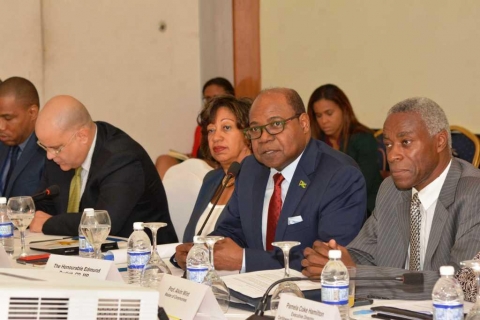64 Knutsford Boulevard, Kingston 5, Jamaica
 : (876) 920-4926-30 |
: (876) 920-4926-30 |  : info@mot.gov.jm
: info@mot.gov.jm

Bartlett – Regional Collaboration Is the Path to Investment

MONTEGO BAY, Jamaica; Wednesday, December 6, 2017: Caribbean government ministers and senior officials of investment promotion agencies have been told they must embrace regional collaboration and harmonization of policies as a valuable strategy to promoting investment in the region.
The charge came from Minister of Tourism, Hon Edmund Bartlett in his keynote address at the ‘Ministerial Roundtable on Investment Promotion in the Caribbean’, yesterday at the Iberostar Rose Hall Suites in Montego Bay. The event was hosted by the Caribbean Export Development Agency (Caribbean Export) in collaboration with the Caribbean Association of Investment Promotion Agencies (CAIPA) and JAMPRO.
Minister Bartlett pointed out that the Caribbean was vulnerable and each country going it alone did not give them the economies of scale. However, with a combined population of 40 million, “if we project the region as one there is a bigger market to appeal to investors who, for instance, could set up an operational base in Jamaica and reach out to the other islands.”
Quoting from the World Investment Report 2017, Minister Bartlett pointed out “global foreign direct investment (FDI) lost momentum in 2016, showing that the road to recovery remains bumpy.” FDI inflows decreased by 2 percent to US$1.75 trillion “amid weak and significant policy risks.”
The report went on to state, “the downward trend in FDI flows to Latin America and the Caribbean accelerated, with inflows falling 14 percent to US$142 billion, owing to continued economic recession, weak commodity prices and pressures on exports.”
FDI is seen as the largest and most constant source of finance for Caribbean economies with positive spill over effects in such areas as technology transfer, job creation and insertion into the global value chain as “essential not just to trade arrangements that we put together but indeed, as we look for investment within the region as well.”
Underscoring the importance of deliberations by the association, Minister Bartlett said with investors often looking at the region before making a decision in which country to invest, “Making the Caribbean brand known must become a priority for us if any of us is to benefit from investments. We must proactively engage with each other and face this challenge of low foreign investment together as we face other challenges that confront us in the face of our new realities.”
Among issues that he said must be addressed, were climate change, regional security, regulation of the foreign service sector, unemployment in general and poverty as an offshoot “as we seek to build out a strategy to drive more investment in our region.” Adding investment promotion and policy dialogue was also necessary, he said as survival of small economies depended on that.
Of major concern to many, said Minister Bartlett, was how to make Caribbean integration work with countries struggling to achieve economies of scale because of their size and the transportation challenge, which he said, was at the core of efforts to do collaborative activities.
“And how do we get over the notion of political integration which is fraught with all kind of difficulties and causes all sort of things, insularity and feeling of nationalism, to creep in? How do we make that transition to what we call a more collaborative approach?” he questioned, adding, “How do we get to avoid political logic and to focus on economic logic?”
Minister Bartlett suggested that understanding tourism presented a huge pathway to understanding the value of regionalism, regional cooperation and collaboration. “Perhaps that’s where the economic logic needs to come from and a tourism diplomacy might very well be the vehicle to make this transition,” he said.
He directed the ministers and their senior investment officials’ minds to consider how to come together and work together to create the power of a Caribbean that was very visible to a world that viewed all the islands as one geographic area called the Caribbean.




